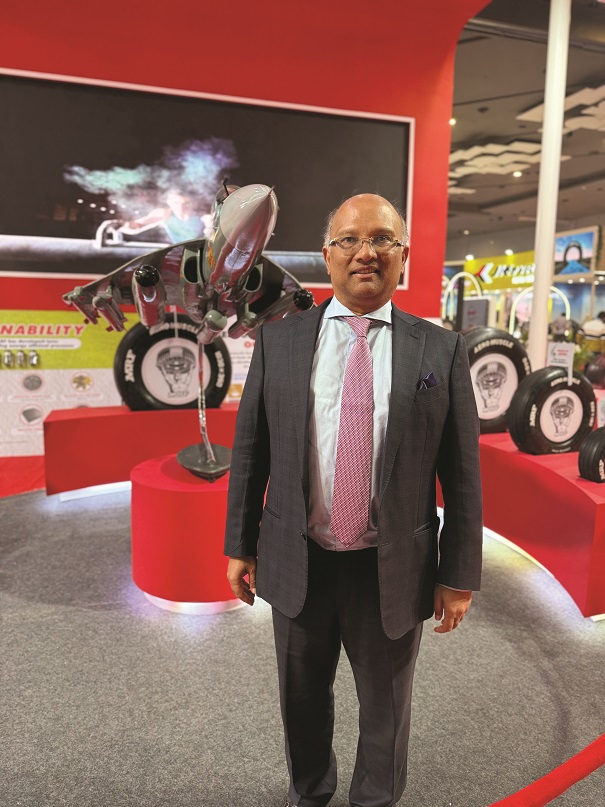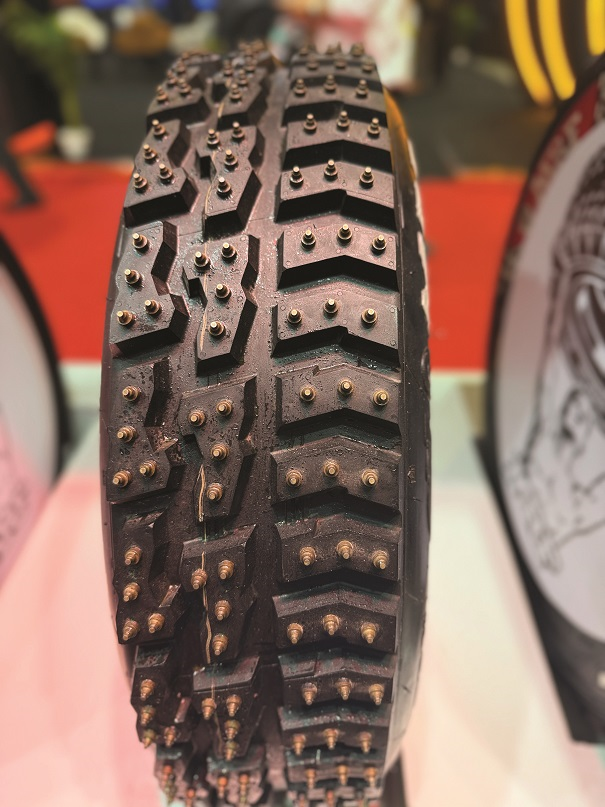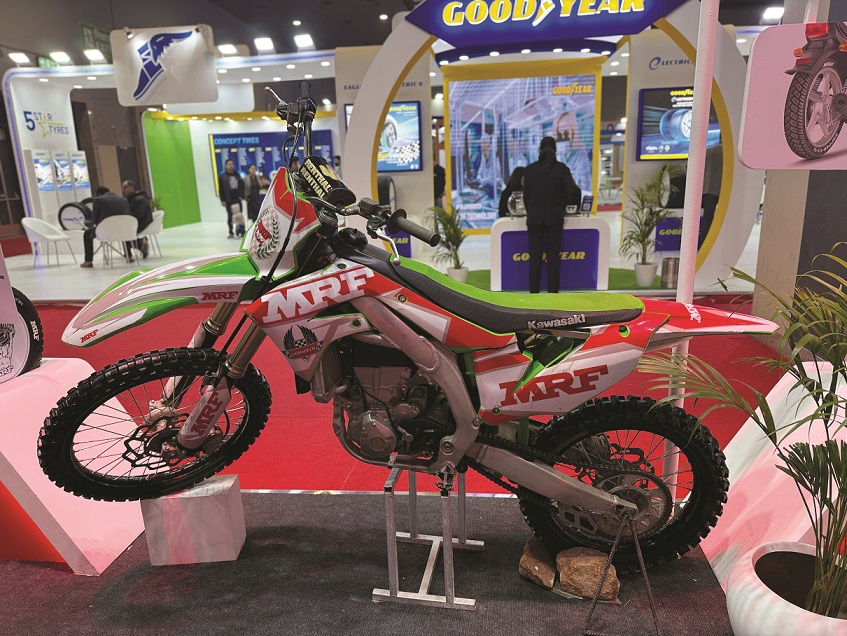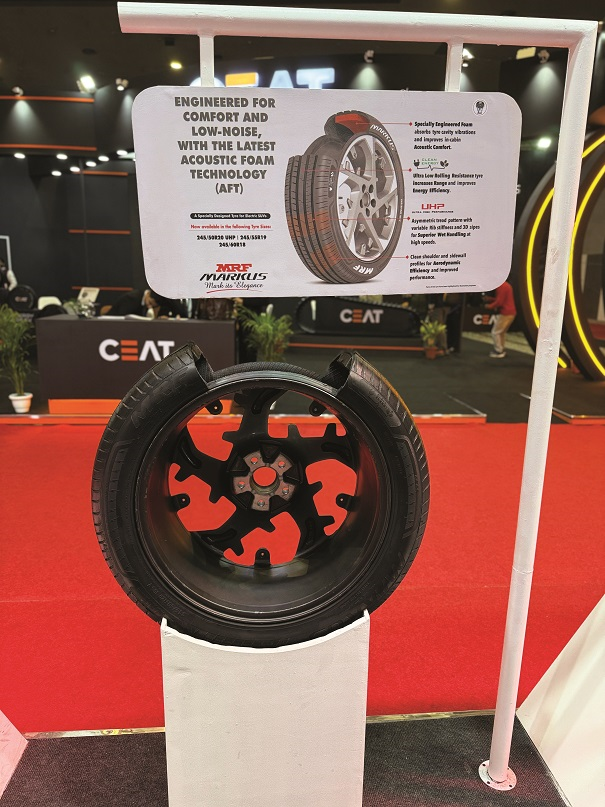Economic Prosperity, OEM Demand Driving Tyre Volumes: Arun Mammen
- By Sharad Matade & Gaurav Nandi
- March 11, 2025
MRF continues to lead the tyre industry with a strong focus on quality, innovation and customer satisfaction. With a presence in over 70 countries, MRF’s dominance spans across categories including commercial vehicles, two-wheelers, electric vehicles (EVs) and aircraft tyres. As India’s economic growth drives increased demand for commercial vehicles, MRF capitalises on this shift towards larger trucks and the expanding EV market. Additionally, the company’s technological prowess is evident in its supply of defence aircraft tyres. Despite challenges like rising rubber prices, MRF’s commitment to development and sustainable practices ensures its continued growth and global expansion.
MRF Vice Chairman and Managing Director Arun Mammen opined that India’s economic prosperity is leading to a demand for original equipment, which in turn is driving the volumes for commercial vehicle tyres upwards. Speaking to Tyre Trends on the sidelines of the Bharat Mobility Global Expo 2025, Mammen noted, “The commercial vehicle tyre segment is primarily driven by OEM demand. India’s economic performance is increasing commercial activity, leading to a higher number of trucks being sold. A notable trend in this segment is the shift towards larger trucks. This shift is primarily due to improved road infrastructure. Additionally, these trends see tyre volumes grow even in the replacement market.”

He added, “Government policies over the last 5–6 years have also played a crucial role in shaping the industry. The transition from BS4 to BS6, changes in axle load norms and various other regulatory developments have influenced tyre design and performance requirements. We have remained ahead of these changes, ensuring our products fully comply with government guidelines.”
The company theme for this year at the expo was ‘Muscle in Motion’, which highlighted MRF’s leadership, technology, innovation and sustainability.
MRF has been a leader in the tyre industry for 37 years, covering all categories. The executive noted that while competition was close in some segments, the company continued to have a leading position in tractors, trucks, light commercial vehicles, commercial vehicles and three-wheeler tyre segments. Its market leadership was further reinforced by its financial performance in FY 2023-24 with turnover of over INR 250 billion.
The company is experiencing double-digit growth, particularly in the first half of CY25, while most of the industry had struggled to achieve similar momentum. “We have consistently grown across all tyre categories including infrastructure, farm, two-wheeler and truck tyres,” revealed Mammen.
“Our ability to maintain market dominance for nearly four decades is rooted in a simple yet powerful philosophy, which is quality, customer focus and continuous innovation. We prioritise understanding customer needs and delivering better-thanexpected performance. This relentless pursuit of excellence ensures that we provide the best value for money,” said the official.
EXPANDING PORTFOLIO
A recent media report mentioned that MRF is seeing significant progress in the EV tyre segment, covering both OEM supply and the replacement market.
 Exuding confidence for its EV tyre portfolio with the evolving automobile space in India, Mammen noted, “We are actively innovating in this space and a great example is our new EV tyre, recently supplied to Mahindra for its latest EV launch. This tyre incorporates a unique foam technology that significantly reduces noise, offering a quieter and more comfortable driving experience. With the growing adoption of electric vehicles, such advancements are crucial as EVs inherently produce less mechanical noise, making tyre noise reduction even more essential.”
Exuding confidence for its EV tyre portfolio with the evolving automobile space in India, Mammen noted, “We are actively innovating in this space and a great example is our new EV tyre, recently supplied to Mahindra for its latest EV launch. This tyre incorporates a unique foam technology that significantly reduces noise, offering a quieter and more comfortable driving experience. With the growing adoption of electric vehicles, such advancements are crucial as EVs inherently produce less mechanical noise, making tyre noise reduction even more essential.”
He added, “Our tyres are fitted on several OEM vehicles including that of Maruti, Toyota, Honda and Bajaj models. The EV space will continue to grow as charging infrastructure improves, making electric mobility more convenient for consumers. While passenger vehicles and two-wheelers are currently leading the shift, we expect commercial vehicles to gradually follow suit as fleet operators gain confidence in battery technology and cost efficiency.”
Moreover, the company exclusively supplies tyres for Indian defence aircraft and helicopters with plans to expand the portfolio. Commenting on the same lines, Mammen revealed, “MRF supplies aircraft tyres to India’s defence forces including the Air Force and Navy. The majority of defence aircraft flying today are equipped with MRF tyres. The Indian Government does not import aircraft tyres unless we do not manufacture a specific type, further reinforcing our dominant position in this critical sector.”
MARKET TALK
MRF set up a new plant in Gujarat recently and ongoing expansions across multiple facilities are in process. Mammen noted that factories were continually being upgraded to meet evolving market demands. The company’s export business contributes between 10 to 12 percent in its total revenue, said Mammen.

The company currently exports to 70 countries worldwide. When asked about exploring new regions, the executive highlighted, “We are always looking for new opportunities for growth. A key example is our dominance in rally racing. We have been European champions for two years, beating multinational competitors, and in Asia Pacific, we have been rally champions for nine consecutive years. These victories highlight our engineering excellence and performance capabilities, opening doors to further expand our brand presence.”
Another trend within the Indian tyre market is Tyre-as-a-Service. Commenting on whether MRF plans to foray in the segment, he said, “Tyre-as- a-Service currently accounts for less than a single-digit percentage of the overall business. The limited adoption is due to challenging operating conditions. While some companies initially ventured into this space, many later exited due to difficulties in scaling the model. We continue to monitor this segment and will assess its potential for expansion in the future.”
TALKING ROADBLOCKS
The official identified the rising prices of rubber as one of the largest problems facing the tyre industry. Mammen explained that raw material costs account for about 70 percent of tyre production costs. As crude oil prices increase, the cost of production also rises, which is further impacted by fluctuations in the rupeedollar exchange rate.
 “The price of natural rubber has remained high for a while and this is a challenge for many tyre manufacturers including us. India does not produce enough natural rubber to meet domestic demand, so we rely on imports to supplement local supply. This dependency on imports means we are exposed to fluctuations in global rubber prices, which can impact our overall cost structure,” said Mammen.
“The price of natural rubber has remained high for a while and this is a challenge for many tyre manufacturers including us. India does not produce enough natural rubber to meet domestic demand, so we rely on imports to supplement local supply. This dependency on imports means we are exposed to fluctuations in global rubber prices, which can impact our overall cost structure,” said Mammen.
Despite the challenges, the company’s near-term research and development focus will involve both recycling raw materials and exploring green energy solutions such as energy and water recycling while also controlling wastage.
The company had made a Capex of over INR 21 billion in the previous financial year and nearly INR 7 billion in the first six months of the current financial year. These investments are directed towards areas with growth opportunities in truck, passenger and two-wheeler markets.
When asked about retail expansion, Mammen noted that there is always room for growth, both in expanding the dealer and retailer network and in online retail.
Discount Tire Earns Spot On Glassdoor's Best Places To Work 2026 List
- By TT News
- February 04, 2026

Discount Tire has earned a prominent position on Glassdoor's Best Places To Work 2026 list, ranking 14th in Consumer Services and within the top 100 US employers. This distinction is awarded to organisations with over 1,000 employee reviews on Glassdoor and a minimum rating of 3.5. For the Scottsdale-based retailer, with more than 1,250 locations nationally, the honour underscores a long-standing commitment to its workforce.
The company cultivates a people-first culture for its over 30,000 employees by providing substantial career growth, thorough training, leadership development and competitive benefits. This philosophy, centred on serving others and empowering personal goals, previously earned Discount Tire top Glassdoor rankings from 2018 through 2021. The latest recognition reaffirms its status as an employer dedicated to fostering a supportive and progressive workplace.
Dean Muglia, Chief Executive Officer, said, "We treat our people like family. We're honoured to be recognised by both current and former employees and Glassdoor as a best place to work. We strive every day to deliver the most inviting, easy and safe experience possible for our people and our customers."
Michael Zuieback, Executive Chairman, said, "Through six and a half decades of growth, our primary commitments have stayed true: We want to take care of people and help make more dreams come true.”
Radar Tyres Secures Strategic Multi-Year Partnership With Cricket South Africa
- By TT News
- February 04, 2026

Radar Tyres has entered a significant, multi-year global partnership with Cricket South Africa, a strategic move to build its brand within a sport enjoyed by a worldwide audience. This alliance grants the company headline sponsorship for the Proteas Men’s and Women’s T20 International sides, alongside associate partnership status for their ODI and Test matches. Radar will also be the headline partner for South Africa’s Under-19 national teams.
The collaboration provides substantial visibility, featuring exclusive logo placement on both match and training kits, with the new T20I apparel already unveiled. For Radar, this investment is a key step in leveraging high-profile platforms to enhance global brand recognition, all while maintaining its commitment to providing high-quality, value-driven tyre products.
G S Sareen, President and CEO, Omni United, said, "Becoming the Global Partner of the Proteas marks a significant milestone in Radar Tyres' global brand journey and reflects our belief in sport as a powerful platform to build brand equity, strengthen dealer support, enhance trust and credibility and connect with households worldwide. Through this partnership, we are able to engage with cricket fans both locally and globally while reinforcing Radar Tyres' as a reliable, performance-driven brand committed to delivering premium-performance at an accessible price point."
Pholetsi Moseki, Chief Executive Officer, CSA, said, "CSA is extremely proud to partner with Radar Tyres, an organisation that shares our values and commitment to excellence. This partnership is a significant milestone, securing support not only for our senior teams but for our junior teams as well. This partnership reflects our deliberate approach to working with like-minded organisations, guided by a long-term vision of developing the game, supporting our players and delivering memorable experiences for fans. Radar Tyres' support also reinforces CSA's commitment to excellence and inclusion, strengthening our ability to drive high performance across all levels."
AZuR Shortlisted For German Award For Sustainability Projects 2026
- By TT News
- February 03, 2026

For the second consecutive year, the Alliance for the Future of Tyres (AZuR) has been shortlisted for the German Award for Sustainability Projects, following its 2025 win. This renewed nomination underscores the jury’s recognition of AZuR as a pioneering force in sustainability, particularly for its dedicated efforts to advance tyre retreading as a core component of a circular economy. The 2026 award ceremony will be held under the patronage of Brigitte Zypries on 17 September in Berlin.
AZuR’s multifaceted initiative extends well beyond theoretical advocacy. Its work gained significant international attention with the Retreading Summit, held in September 2025 at KRONE Trailer in Werlte. This event convened experts from industry, politics, academia and media for two days of intensive dialogue on the potential, challenges and necessary policy frameworks for tyre modernisation, leading to the launch of concrete action plans. Furthermore, the alliance drives progress through strategic communications and direct support for flagship projects, such as the new passenger car tyre retreading facility established by Rigdon in Pfaffenhofen.
Central to AZuR’s mission is transforming public perception by demonstrating that worn tyres are valuable resources, not waste. Through ongoing awareness campaigns, it highlights the substantial ecological and economic benefits of retreaded tyres, which can be refurbished multiple times to conserve raw materials, reduce climate impact and offer cost-effective solutions. The German Award for Sustainability Projects, judged by a panel chaired by Prof Dr Claudia Kemfert of DIW Berlin, evaluates entries based on their innovation, impact and relevance to a sustainable future. AZuR’s repeated shortlisting affirms that its model for a tyre circular economy is a replicable and exemplary system with groundbreaking potential.
- Manish Maharaj
- Balkrishna Industries Ltd
- BKT Tyres
- Apollo Tyres Ltd
- Tyre Industry
- Business Finance Leadership
Manish Maharaj Joins BKT Tyres as GM & Head of Business Finance
- By Sharad Matade
- February 02, 2026

Seasoned tyre industry executive Manish Maharaj has embarked on a new professional chapter, joining Balkrishna Industries Ltd (BKT Tires) in a senior leadership capacity after a distinguished 11-year tenure with Apollo Tyres Ltd.
In his new role at BKT Tires, Maharaj has been appointed General Manager and Head of Business Finance, where he will focus on enhancing financial strategy, driving performance-driven growth, and building scalable systems to support BKT’s global expansion ambitions.
“I am thrilled to begin a new chapter with BKT Tires,” said Maharaj.
Maharaj’s career at Apollo spanned multiple strategic roles in one of the world’s leading tyre manufacturers, most recently serving as Regional Chief Financial Officer for South East Asia, the Middle East and Africa, and later as Business Head for South East Asia. In these capacities, he led multi-market commercial and financial operations, driving robust business performance across diverse cultural and economic environments.
At Apollo, Maharaj was responsible for charting growth strategies in fast-evolving markets, strengthening distributor partnerships, and reinforcing brand positioning across key ASEAN economies. His leadership coincided with initiatives to expand premium brand presence in Thailand, Malaysia, Philippines & South Korea and foster deeper retail engagement across the ASEAN region.







Comments (0)
ADD COMMENT